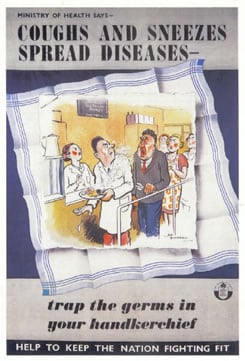Coughing & Sneezing

This vintage British poster from World War II shows that coughing and sneezing has long been a public health concern. Today, we know that handkerchiefs aren’t always the best way to handle coughing and sneezing! For modern methods, read the text at left.
Hygiene etiquette involves practices that prevent the spread of illness and disease. A critical time to practice good hygiene etiquette is when you are sick, especially when coughing or sneezing. Serious respiratory illnesses like influenza, respiratory syncytial virus (RSV), whooping cough, and severe acute respiratory syndrome (SARS) are spread by:
- Coughing or sneezing
- Unclean hands
- Touching your face after touching contaminated objects
- Touching objects after contaminating your hands
To help stop the spread of germs:
- Cover your mouth and nose with a tissue when you cough or sneeze.
- Put your used tissue in a waste basket.
- If you don’t have a tissue, cough or sneeze into your upper sleeve, not your hands.
Remember to wash your hands after coughing or sneezing:
- Wash with soap and water, or
- Keeping hands clean through improved hand hygiene is one of the most important steps we can take to avoid getting sick and spreading germs to others. Many diseases and conditions are spread by not washing hands with soap and clean, running water. If clean, running water is not accessible, as is common in many parts of the world, use soap and available water. If soap and water are unavailable, use an alcohol-based hand sanitizer that contains at least 60% alcohol to clean hands.
Cough etiquette is especially important for infection control measures in healthcare settings, such as emergency departments, doctor’s offices, and clinics. More information on respiratory hygiene and cough etiquette in healthcare settings may be found on CDC’s seasonal flu pages.
One final practice that helps prevent the spread of respiratory disease is avoiding close contact with people who are sick. If you are ill, you should try to distance yourself from others so you do not spread your germs. Distancing includes staying home from work or school when possible.
For more information on stopping the spread of germs, please visit CDC’s Good Health Habits for Preventing Seasonal Flu pages





















.png)












No hay comentarios:
Publicar un comentario